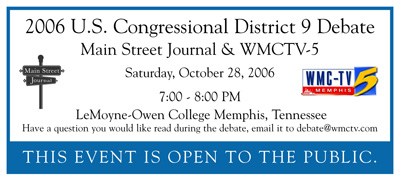
LeMoyne-Owen College is located at 807 Walker Avenue in Memphis, near Elmwood Cemetery.
UPDATE: The following is an excerpt from our November issue:
On the River: 9th Congressional Debate
By Mick Wright
Following the final debate of the 9th Congressional race, Republican Mark White confided that he had expected the evening to be about “bigger issues.” Instead, divisions caused by partisan loyalties, racial concerns, and political reputations had once again dominated the discussion.
The debate, presented by WMC-TV and the Main Street Journal, was held at Brownlee Hall on the small campus of LeMoyne-Owen College, a historically-black institution. One floor below the stage, about a dozen spectators who had arrived too late to be seated were huddled around a black and white television with poor reception and a 5′’ screen. They had settled for this arrangement after finding that the building’s two TVs were inoperable, thankful that someone had brought a portable unit.
So while the candidates debated, the night’s unofficial focus group was busy adding its own layer of discussion to the mix. One woman had a bumper sticker for Independent candidate Jake Ford stuck to the back of her sweater. She couldn’t help agreeing when White challenged the news media to “start being more positive.”
But much of the rhetoric exchanged that night seemed appropriate for that little screen, the product of politicians either too short-sighted to offer a greater vision for the city or too sly to keep from pandering to its most basic anxieties – promising to provide more jobs, higher wages, greater access to healthcare, and better education.
Ford said his main issue was “working-waged Americans earning a piece of the pie,” a theme carried over from a campaign commercial that finds him sitting around a kitchen table making a promise to help people get their fair slice.
Of course, this give-me-mine attitude is a far cry from President Kennedy’s famous line, “Ask not what your country can do for you, but what you can do for your country.”
It was Kennedy, by the way, whose optimistic drive led Americans to be the first to land on the moon (apologies to Nicolas Carraway). But Democratic candidate Cohen admitted that he had “never been very fond of the space program, really,” opting instead to divert NASA’s budget to fund more medical research.
Admittedly, space travel isn’t always the first priority for those with a low income. That point can be easily understood in a place like LeMoyne-Owen, which has recently been on the brink of financial disaster.
Our investments in NASA, though, have led to significant advances in science, communications, national security, weather forecasting, and, yes, medical technology as well.
The real question advanced by the debate was not who would lead Memphis, but how. Would our representative be able to make the tough choices of a visionary and lead us on a brighter, bolder path?
As Kennedy said, “We choose to go to the moon in this decade and do the other things, not because they are easy, but because they are hard.”

